Ted Cruz downplays Trump raising concerns over Canadian birth
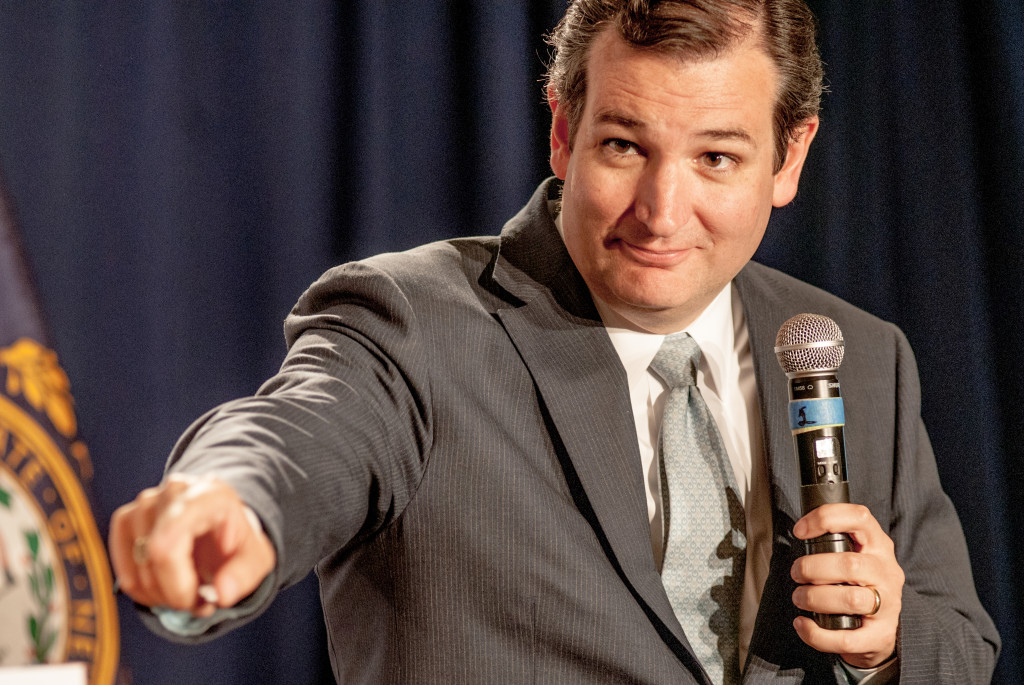
Ted Cruz tried to make a joke Tuesday out of Republican presidential rival Donald Trump raising questions about whether the Texas senator’s birth in Canada could be a liability if he becomes the GOP’s nominee. Trump told The Washington Post in an interview Tuesday that Cruz’s Canadian birthplace and his holding a double passport was a “very precarious” issue that “a lot of people are talking about.” Trump has ramped up his attacks on Cruz since the Texas senator sprinted ahead of the billionaire businessman in some opinion surveys in early-voting Iowa. Cruz, in response to questions about Trump’s comments, said the best way to respond was to laugh it off and “move on to the issues that matter.” He first reacted on Twitter, posting a link to a video from the 1970s television show “Happy Days” showing the character Fonzie water skiing over a shark. The moment, known as “jumping the shark,” has come to refer to the use of a gimmick to halt the decline of a television show or other effort. “What the American people are interested in is not bickering and back and forth,” Cruz told reporters before a town hall in Sioux Center that drew hundreds of people. Cruz was concluding the second day of a six-day swing through Iowa before the Feb. 1 caucuses, while Trump was holding a rally in New Hampshire. The U.S. Constitution says only a “natural born Citizen” may be president. Legal scholars, however, generally agree the description covers foreign-born children of U.S. parents. Cruz was born in Calgary, Alberta, in 1970 while his parents were working in the oil business there. His mother, Eleanor, is from Delaware, while his father, Rafael, is a Cuban who became a U.S. citizen in 2005. Cruz has said that because his mother is a citizen by birth, he is also one. Under U.S. law, anyone born to a U.S. citizen is granted citizenship no matter where the birth takes place. Cruz renounced his Canadian citizenship in 2014, amid speculation he was preparing for a presidential run, less than a year after he released his birth certificate. But that didn’t stop Trump from raising the issue Tuesday. “Republicans are going to have to ask themselves the question: ‘Do we want a candidate who could be tied up in court for two years?’ That’d be a big problem,” Trump said in The Washington Post interview. “It’d be a very precarious one for Republicans because he’d be running and the courts may take a long time to make a decision. You don’t want to be running and have that kind of thing over your head.” Trump was one of the loudest voices questioning whether President Obama was born in Kenya and thus not eligible to be U.S. president. Obama is an American citizen born in Honolulu; his father was Kenyan, his mother American. Previous foreign-born Americans — notably Republicans John McCain and George Romney — have run for president with some mention, but no serious challenges, of their eligibility. The comments mark a reversal for Trump, who in September downplayed Cruz’s birthplace in an interview with ABC. “I hear it was checked out by every attorney and every which way and I understand Ted is in fine shape,” he told the network then. But Trump has been ratcheting up his attacks on Cruz in recent weeks. Trump first unleashed a verbal assault on Cruz in December at an event in Des Moines where he questioned Cruz’s evangelical faith. “I do like Ted Cruz, but not a lot of evangelicals come out of Cuba,” he said of the country where Cruz’s father, an evangelical preacher, was born. Republished with permission of the Associated Press.
Hillary Clinton trying to light fire among Iowa activists
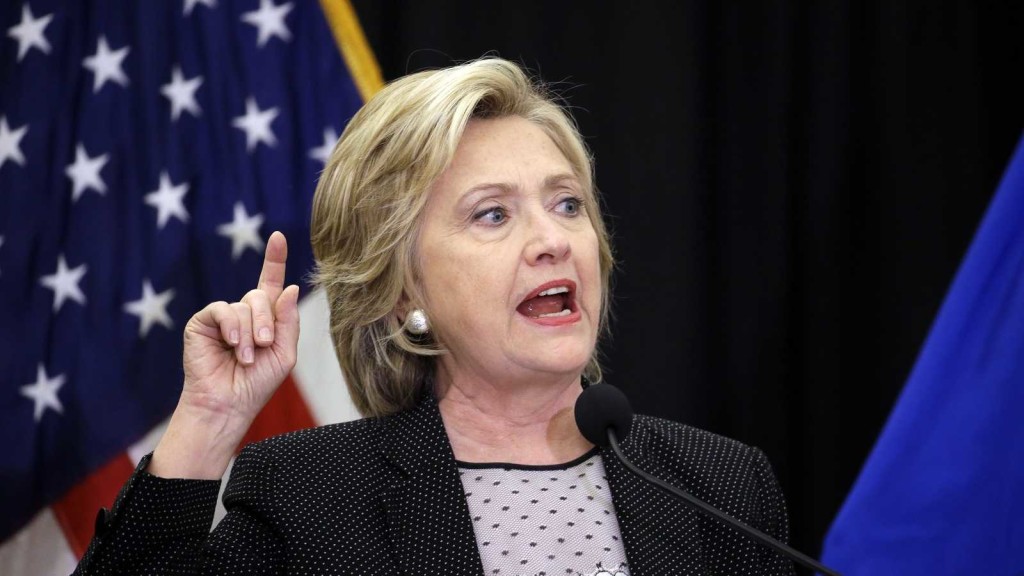
National polls notwithstanding, Hillary Clinton is guarding against complacency as she travels along the snow-covered fields of Iowa. “I need you,” she says repeatedly on the rope-line between handshakes and selfies. Wary of another mishap in Iowa, Clinton is preaching a message of urgency, challenging her supporters to dig in during the final month before the state’s lead-off presidential caucus. She casts her candidacy as a check against Republicans and avoids mentioning her main Democratic rival, Bernie Sanders, whose polling numbers remain at striking distance. “We can’t take anything for granted,” Clinton said at Des Moines’ State Historical Museum Monday night, a replica of a massive wooly mammoth looming off to the side as she spoke. “It doesn’t happen just because we wish it. It doesn’t happen because it’s inevitable.” Clinton’s presidential bid faltered in Iowa in 2008, when she finished third against then-Sens. Barack Obama and John Edwards. She defeated Obama in the New Hampshire primary but the future president prevailed after outlasting Clinton in a series of contests during the spring. This time, Clinton has built a formidable team of field organizers around Iowa, mindful of the ground game edge that Obama had in the state in 2007 and 2008. Polls have shown Sanders leading in New Hampshire, his neighbor to the east, giving Clinton little margin for error here. If the former secretary of state stumbles in Iowa again and is defeated by Sanders in New Hampshire, it would almost certainly renew worries about her ability to unify the party’s liberal and moderate factions. She enjoys strong support among Latino and black voters who are pivotal in Nevada and South Carolina, the third and fourth contests, but consecutive losses might diminish her standing. “If I get off to a good start here in Iowa, we’re halfway home,” Clinton said in Davenport. During a stop Tuesday night in Council Bluffs, she urged Democrats to consider a candidate’s “electability and how we make sure we have a Democrat going back in the White House in January 2017.” Few and far between are the days between now and the Feb. 1 caucuses in which Clinton or one of her messengers aren’t scheduled to campaign around Iowa. Former President Bill Clinton will be in Cedar Rapids and Dubuque on Thursday on behalf of his wife, and is certain to return. Her team is also dispatching backers like Virginia Gov. Terry McAuliffe, a top adviser during her 2008 campaign, and actress Lena Dunham of HBO’s “Girls” in the coming days. “Nobody’s complacent because of the 2007 and 2008 experience. This is not a done deal,” said Agriculture Secretary Tom Vilsack, a former Iowa governor introducing Clinton at events on Monday. “I like what she’s doing — she’s reminding people what’s at stake here. That’s a motivating factor.” Much of Clinton’s message revolves around defending Obama’s legacy. She warns that a Republican president would repeal Obama’s health care law, slash taxes on the wealthy, and undercut executive actions on gun violence and pollution. Part of her goal is to make a personal connection with voters over issues, as she puts it, “that keep families up at night.” In Sioux City on Tuesday, she rolled out a new initiative to provide more federal resources for 3.5 million Americans with autism. Last month, she announced a $2 billion plan to address Alzheimer’s during a stop in Fairfield, Iowa, and she frequently talks about substance abuse and mental health problems at events. Democrats say Sanders appears to have made a more emotional connection with his supporters — even though polls show him trailing here — while Clinton is viewed as the party’s standard-bearer and favorite to win the nomination. “He seems more genuine,” said Dan McCarthy of Bettendorf, a defense worker who spoke about Sanders as he sat with his mother before a Clinton event in Davenport. “I don’t like the idea of having the same people over and over again. You’re not going to change anything.” McCarthy said he was supporting the Vermont senator while his mother, Joan, said she was still assessing the Democratic field. But Clinton’s argument brought at least one fence-sitter onto her side in Des Moines. “To me, it’s who is more electable,” said Al Hart, a retired social studies teacher from Ankeny who said he decided to support Clinton after listening to her speech at the museum. “I think she’s got the fire in belly to get elected. She’s been through this before.” Grant Woodard, a Des Moines lawyer and veteran of several Democratic campaigns, said the size of the caucus would play a major role given Sanders’ attempt to attract college students and first-time caucus-goers. Most expect it to fall somewhere between 2008’s record of about 240,000 and the 125,000 who participated in 2004. “Sanders people are more motivated but I am not sure there’s enough of them,” Woodard said. As for Clinton, he said the challenge was simple: “How do you keep them motivated when folks think this is in the bag?” Republished with permission of the Associated Press.
Cash-rich super PACs prolong flagging presidential campaigns

Jeb Bush‘s recent cancellation of advertising plans in Iowa and South Carolina was yet another cost-saving step for a down-in-the-polls presidential campaign that had already thinned its staff. If not for his flush super PAC, the Republican might be gone from the contest by now. That group, Right to Rise, has burned through half of its $103 million — which still leaves it with about as much cash as John McCain spent during the entire 2008 GOP nominating contest. In the 2016 race, money isn’t buying love from voters. It is, however, buying some candidates more time. Less than a month before voting begins, the Republican field is still thick with a dozen presidential hopefuls. Super PACs are one reason why. Like Bush, Chris Christie and John Kasich are leaning heavily on these outside groups to communicate with voters. Nearly 96 percent of the money for Bush, Kasich and Christie commercials has come not from their official campaigns, but from their supportive super PACs, according to advertising tracker Kantar Media’s CMAG. This is the second presidential campaign since super political action committees burst on the scene after the Supreme Court’s Citizens United decision. The 2010 case made it clear that donors can contribute unlimited amounts of money to groups supporting specific candidates, so long as the candidates don’t directly control the spending. That means that at any given time a wealthy admirer of a candidate can write a huge check to a super PAC to help keep that person in front of voters, through commercials and mailings. Some super PACs, including one for Carly Fiorina, even have campaign-like voter outreach efforts such as door-knocking and publicizing events that feature the candidate. Those super PAC investments work as an incentive against a candidate giving up too soon, however dim the prospects. While super PACs have dumped buckets of money into politics, they’ve also helped ensure a more competitive democratic process, said Bradley Smith, a former federal elections commissioner who advocates for looser fundraising restrictions. “The complaint used to be that the candidates would fold up before anyone even voted,” said Smith, founder and chairman of the Center for Competitive Politics. “It’s not a bad thing that’s not the case anymore.” One of the first presidential hopefuls to take advantage of the post-Citizens United campaign finance landscape was Newt Gingrich, the former House speaker who sought the 2012 GOP nomination. Las Vegas casino billionaire Sheldon Adelson put up $20 million of his family’s money to back his longtime friend Gingrich. That money paid for TV ads when the candidate couldn’t afford his own, helping him stay afloat through third-to-vote South Carolina, which he won. Rick Santorum was in a similar position, benefiting from Wyoming investor Foster Friess’s super PAC assistance until his candidacy took flight after a surprising Iowa win. “There’s no question that a super PAC gives you the ability to sustain the appearance of a campaign even if you can no longer raise money,” Gingrich told AP. Both eventually lost to Mitt Romney, who dominated traditional campaign fundraising and also had a big-money super PAC helping out. Gingrich said the 2016 race differs from 2012 in several crucial ways. “That was one guy with a bunch of money versus the rest of us, and now it’s a bunch of guys with a bunch of money,” he said. At the same time, a celebrity businessman and political newcomer has shown that “money may not matter as much,” Gingrich said. Donald Trump‘s campaign only recently made its first TV ad, putting up $2 million to air it this week in Iowa and New Hampshire. He has dominated the GOP contest without spending much campaign money, and without major help from super PACs — which he has decried as “disgusting.” Bush, a former Florida governor, is in roughly the opposite position: His super PAC Right to Rise has pumped more than $50 million into its advertising campaign, yet he remains in the single digits in most preference polls. The group is pressing ahead. It has booked at least $24 million more in ads over the next nine weeks in 10 states, including early voting Iowa, New Hampshire and South Carolina, CMAG shows. Over the weekend, Bush’s official campaign cuts its South Carolina advertising plan by half and pulled its Iowa ad reservations altogether, an Associated Press analysis of the CMAG data found. Kasich, governor of Ohio, just began airing his first television ad on Tuesday, according to the campaign. But his super PACs have been busy for months. They’ve showered New Hampshire viewers with almost $10 million worth of commercials and this week told federal regulators they’re buying more ad time and distributing pro-Kasich — and anti-Christie — literature to voters. Republished with permission of the Associated Press.
Marco Rubio: Can’t “Fix America” from GOP-held House, Senate
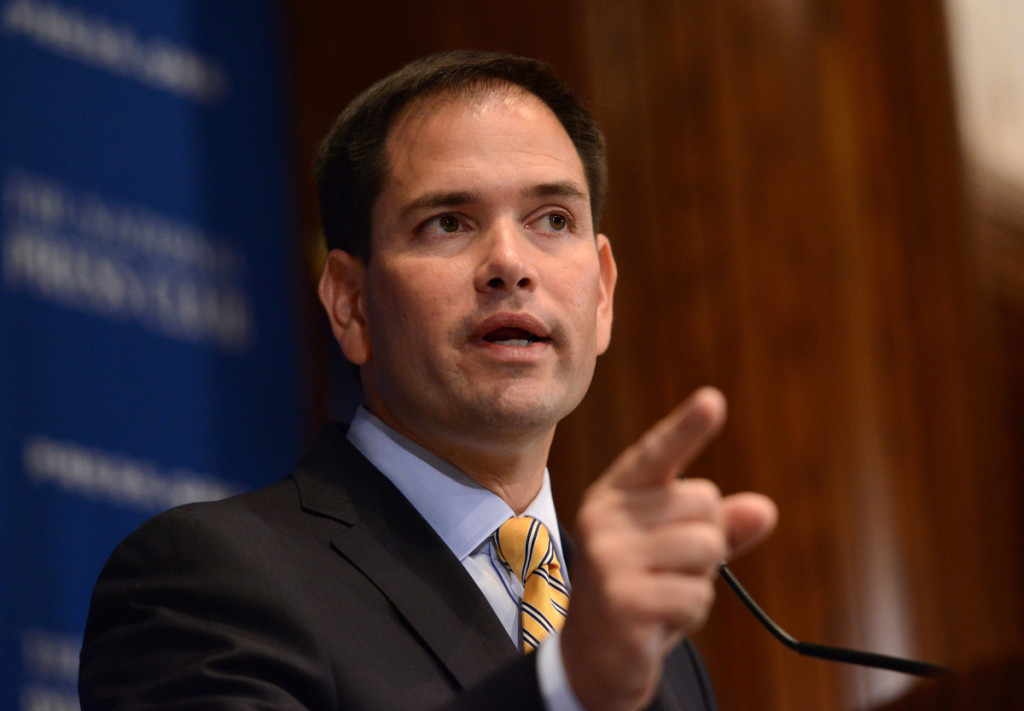
After five years in the U.S. Senate, Florida Sen. Marco Rubio is dismissing Congress’ ability to change much about America. “We’re not going to fix America with senators and congressmen,” Rubio charged during a Tuesday town hall-style meeting with voters in Cedar Rapids, Iowa. Only presidents, he said, can set the nation’s policy agenda. Rubio, who is running for president, was responding to a question about missing Senate votes in recent years. Rubio said his voting record “is close to 90 percent” during this, his first and only term in the Senate. He could have run for Senate re-election and the White House at the same time, but decided to forgo a second term and focus on his White House campaign. “I have missed votes this year,” Rubio conceded at the Cedar Rapids event. “You know why? Because while as a senator I can help shape the agenda, only a president can set the agenda. We’re not going to fix America with senators and congressmen.” Members of the House and Senate, especially those on the campaign trail, routinely distance themselves from the unpopular Congress. Doing so is an especially potent applause line this presidential campaign year, in which outsiders such as billionaire developer Donald Trump, who has never held public office, have built up solid support among Republican voters. Republican presidential rival Ted Cruz, a Texas senator, delights in asserting that his unpopularity among members in both parties makes him an establishment outsider in Washington. Adding his voice to the anti-Washington talk, Rubio on Tuesday vowed to put “the full weight and force of the presidency” behind a plan to institute term limits for members of Congress. “You’re going to get better government when you have new people constantly coming in,” he said. “What happens over time is you get stale. You lose your drive. You become a creature of the institution. You fall in love with the institution. You think defending the Senate is more important than fighting on behalf of America.” Republished with permission of the Associated Press.
Meet the Alabama Members of Congress who pack heat

Alabama’s own Rep. Mo Brooks (AL-05) and Rep. Gary Palmer (AL-06) practice what they preach when it comes to the Second Amendment: Not only do they support it with their votes in Congress, but they also pack heat. According to the Daily Caller, Brooks and Palmer are among 17 Members of the U.S. House of Representatives‘ House Freedom Caucus who say they currently carry, or did as of 2013. “I do have a concealed carry permit, as does my wife,” Brooks told The Daily Caller News Foundation (TheDCNF). “There’s terrorism and there’s crime,” Brooks said. “You never know when either one is going to happen. You can rely on terrorists and criminals not to hurt you, or you can prepare yourself so they don’t hurt you. I trust myself more than the terrorist.” When TheDCNF asked Palmer if he owns a gun, he told them asking if he owns a gun is the wrong question. “The question should be, how many?” Palmer said. The members of the House Freedom Caucus — arguably the most pro-Second Amendment caucus in Congress — could soon be gearing up for an epic battle over the Second Amendment as President Barack Obama Tuesday announced “a series of common-sense executive actions” to reduce gun violence, which Palmer says are “beyond the scope of his Constitutional powers.” Here are the members of the House Freedom Caucus who say they currently carry, or did as of 2013 (all are Republicans): Alabama Rep. Gary Palmer Alabama Rep. Mo Brooks Arizona Rep. Paul Gosar Arizona Rep. Matt Salmon Arizona Rep. David Schweikert Arizona Rep. Trent Franks Colorado Rep. Ken Buck Florida Rep. Ted Yoho Florida Rep. Bill Posey Indiana Rep. Marlin Stutzman Louisiana Rep. John Fleming Ohio Rep. Jim Jordan South Carolina Rep. Jeff Duncan South Carolina Rep. Mick Mulvaney Tennessee Rep. Scott Desjarlais Texas Rep. Randy Weber Virginia Rep. Dave Brat According to a 2013 USA Today survey of gun-owners in Congress, Alabama Reps. Martha Roby (AL-03) and Mike Rogers (AL-03) also own guns, but are not members of the House Freedom Caucus.
Alabama’s elected official react to Barack Obama’s gun grab
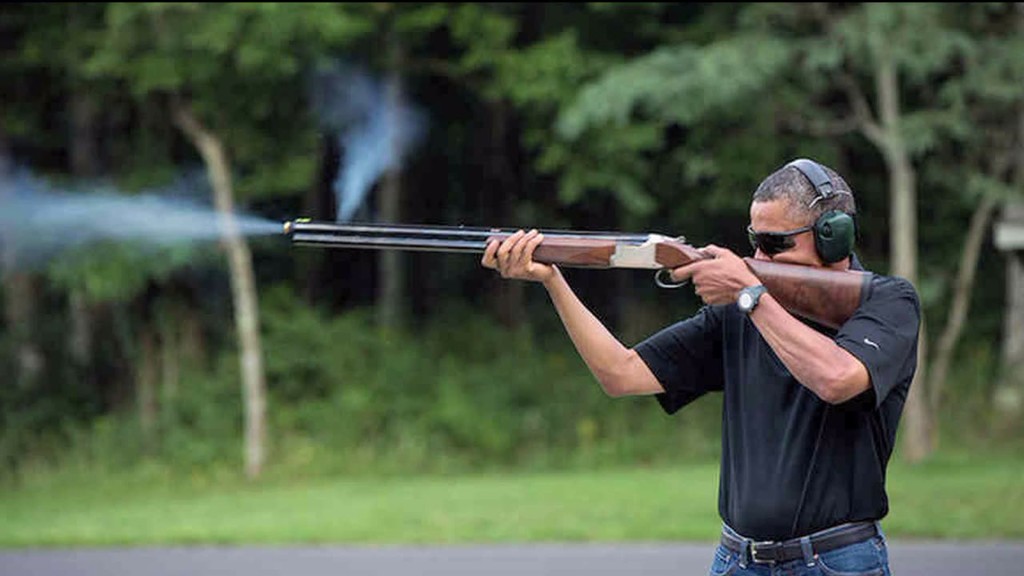
Saying that America faces a “gun violence epidemic” President Barack Obama announced Tuesday “a series of common-sense executive actions” to reduce gun violence that critics across the country contend infringes on Americans’ constitutional right to keep and bear arms. The President’s proposal includes: Requiring those who sell guns at gun shows and online to be licensed. Closing a loophole that allows buyers of weapons such as machine guns to obtain them without going through a background check by buying them through trusts, corporations and other legal entities. Adding 230 new Federal Bureau of Investigation staff to help process mandatory background checks. Adding 200 new Bureau of Alcohol, Tobacco, and Firearms staff to enforce existing gun laws. Holding gun dealers responsible for reporting missing guns. Spending $500 million to “help engage” individuals with serious mental health issues in care. The Alabama delegation reacted strongly to Obama’s proposed gun grab: U.S. Sen. Jeff Sessions: President Obama’s proposal to unilaterally thwart law-abiding citizens’ Second Amendment rights is a blatant abuse of his executive authority. He has chosen to completely circumvent the legislative process, ignore the Constitution, and infringe upon the rights granted to each and every citizen of the United States by the Second Amendment. This is a misguided and unconstitutional power grab, and I will not stand for it. As a lifelong member of the NRA and the Texas Rifle Association, I know that gun laws like those in Texas work better than gun laws like those in Chicago. I have and always will vigorously defend our constitutional right to keep and bear arms and will fight against this tyrannical President’s insistence on eroding our nation’s laws. U.S. Sen. Richard Shelby: None of the executive actions that we expect to hear from the President would have prevented the recent tragic events in our nation. Instead of looking for ways to truly put an end to violent crime and radical Islamic terrorism, the President is once again looking to score political points by taking away the rights of law-abiding Americans to protect themselves. The President should know better than anyone that disarming law-abiding Americans will do nothing more than empower criminals. After all, his own hometown of Chicago has the strictest gun control laws in the country, yet its violent crime rate is among the highest in our nation. Read the Senator’s full statement here. U.S. Rep. Bradley Byrne (AL-02): These expected changes would not have prevented any of the recent mass shootings where guns were purchased from licensed gun dealers. Instead of continuing to ignore Congress, the President should work with us on commonsense reforms that would actually reduce gun violence, like mental health reform and preventing those who wish to bring us harm from entering the United States. In reality, I don’t think President Obama wants to solve the problem. Instead, he is simply looking for another political talking point and continuing to pander to far-left political groups. Congress must be swift to respond to any executive action, and there will certainly be legal challenges as well. This debate is about more than the Second Amendment. This debate is about standing up to an out-of-control President who refuses to follow the Constitution. U.S. Rep. Martha Roby (AL-02): President Obama is wrong to try to bypass Congress to unilaterally mandate his gun control agenda, and it won’t stand. I’m a gun owner myself, and I strongly value the rights guaranteed by the Second Amendment. I will fight on behalf of those I represent to stop any attempt to erode the Second Amendment rights of Americans. There is a reason Congress has repeatedly rejected President Obama’s gun control agenda: on top of being unconstitutional, his proposals would not have prevented the recent attacks he uses to justify new laws. Instead of forcing unconstitutional gun regulations that have little hope of stopping premeditated attacks, I believe our focus should be dealing with the root causes, specifically mental health and terrorism. U.S. Rep. Mike Rogers (AL-03): President Obama has spent his time in office expanding the size of government and infringing on our Constitutional rights. This is just another example of his blatant disregard for the Constitution. I remain completely opposed to any action that puts any level of restrictions on our right to bear arms. As a gun owner myself, I will continue to fight for our Second Amendment rights. U.S. Rep. Robert Aderholt (AL-04): It is unbelievable and I’m at a loss of words at the news President Obama plans to sidestep the Constitution once again in order to circumvent Congress in his efforts to diminish gun owner’s rights in America. This is just another example of President Obama’s attempts to impose his failed agenda on the American people in the waning months of his Presidency. There is not proof that the new restrictions President Obama proposes would have prevented any of the recent cases of gun violence in our country. I’m also confident that these new proposed restrictions on the Second Amendment will not stop any future incidents. As we know our problem in America is not a gun problem. It is a cultural problem and a problem of the heart by these criminals. No new gun laws can change the attitude of someone who is so lost in this world that they are bent on killing others. U.S. Rep. Mo Brooks (AL-05): No statement made thus far. U.S. Rep. Gary Palmer (AL-06): The President’s Executive Actions are beyond the scope of his Constitutional powers. This President has developed a pattern over the past seven years of ignoring the Constitution whenever it suits him. This is wrong. Nothing in the President’s Executive Actions would have done anything to stop the most recent incidents of gun violence. I have always been and will continue to be a strong defender of our Second Amendment rights, and will fight any attempt to infringe upon them. Executive actions are not law and, on January 20, 2017, can be rescinded by the next President. U.S. Rep. Terri Sewell (AL-07): Our nation must take common sense actions to stem the
Jeb Bush criticizes President Barack Obama’s executive orders on guns
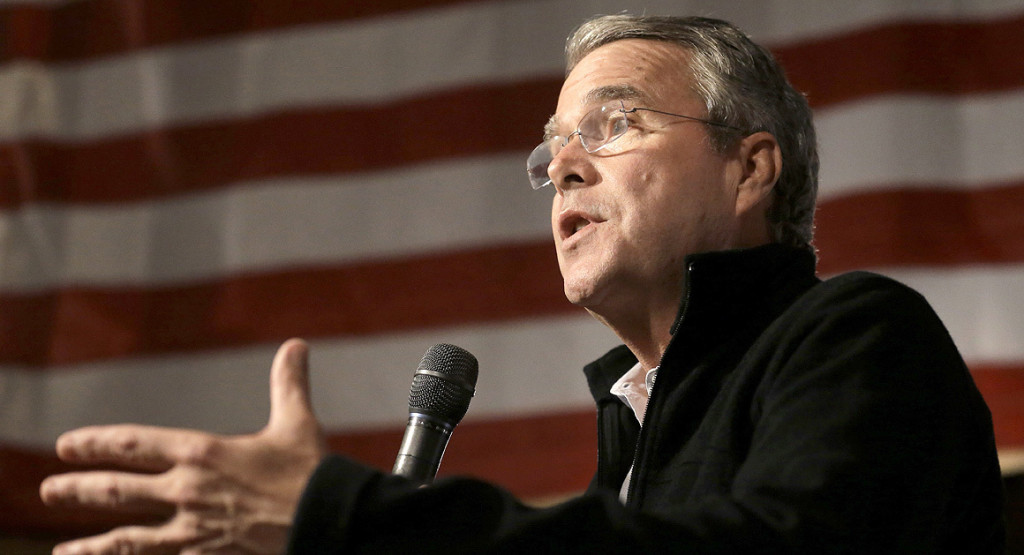
A set of President Obama’s gun-control executive actions show “an utter disregard for the Second Amendment,” presidential hopeful Jeb Bush said in a guest commentary for The Gazette published Tuesday. “Barack Obama has proved again why he will go down as one of the most liberal and divisive presidents in the history of our nation,” the former Florida governor wrote in the guest column in the Iowa newspaper. “Obama’s declaration that he will impose his gun control agenda by executive order shows an utter disregard for the Second Amendment as well as the proper constitutional process for making laws in our nation.” NEW VIDEO: I will fight as hard as I can against any effort by Pres. Obama to challenge our 2nd Amendment rights. https://t.co/zdiunpuwDd — Jeb Bush (@JebBush) Jan.5, 2016 Bush went on to say he would repeal Obama’s “anti-gun executive orders” on his first day in office. He also said he would oppose legislative actions that impose “unnecessary burdens on law-abiding gun owners.” Obama is set to formally announce the package of gun-control executive actions on Tuesday. The announcement comes just weeks from the Iowa caucuses, and will likely push the issue of gun control to the forefront of the 2016 presidential campaign. The executive actions include a background check requirement for guns purchased from dealers, even if they’re bought online or at gun shows. The new federal guidance aims to narrow the so-called gun show loophole that allows some purchases to occur without a background check. In his guest commentary, Bush called the Second Amendment the “original homeland security act.” “Rather than taking guns out of the hands of law-abiding citizens as Obama and Clinton would like to do, we should focus on keeping guns out of the hands of the terrorists who want to kill innocent Americans,” he wrote. “My commitment to responsible gun owners is clear. As president of the United States, I will defend the Second Amendment, always.” This article contains information from the Associated Press.
Counsel in Speaker Mike Hubbard’s ethics suit seeks to withdraw in surprise move
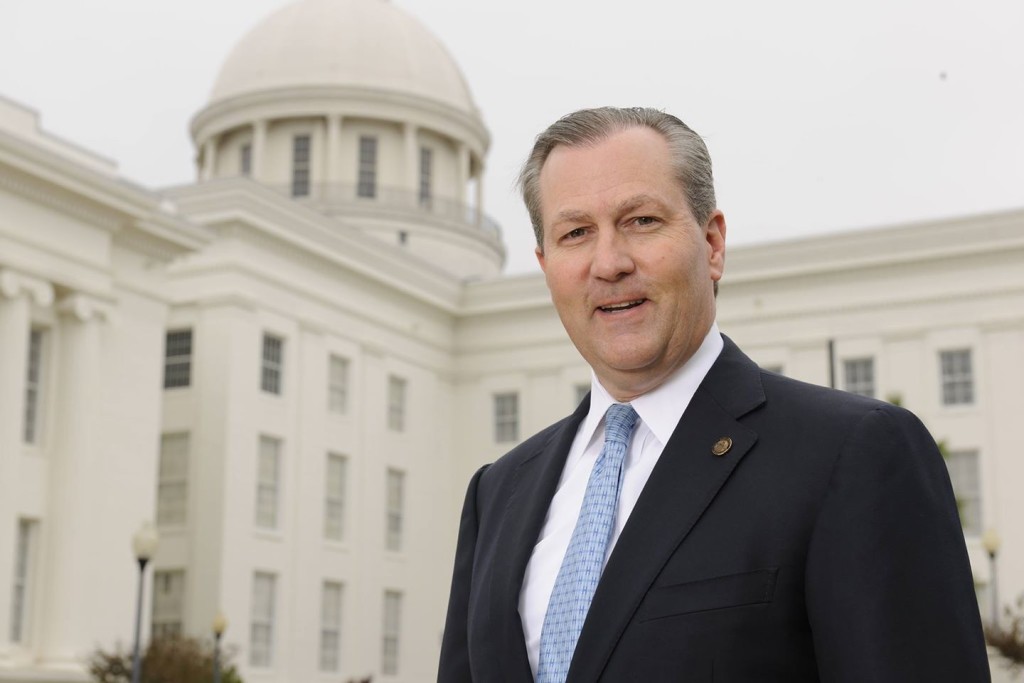
The lead defense attorney for state House Speaker Mike Hubbard in a protracted criminal suit alleging ethics violations, J. Mark White, filed a motion to withdraw from the case last week after representing the embattled House Speaker for the entire length of the proceedings. According to the Alabama Political Reporter, White is exiting the case after nearly two years amid speculation Hubbard has not been able to pay his firm’s legal fees, or perhaps White is seeking to avoid a high-profile loss on his record. White’s conduct during the case is widely considered to include stalling tactics in a case now running twice as long as many observers expected. Notably, White filed a motion to delay the beginning of Hubbard’s trial because the attorney has to accept an award, namely his election as Dean of the International Academy of Trial Lawyers. White is scheduled to give a talk to the group during its convention on April 2-5, just a week after the slated March 28 start to his client’s trial. Prosecutors objected to that move, which made White bristle. “Typically these get handled with professional courtesy, but the state elected otherwise,” White said. White’s move may cause further complications in a fraught case which has seen the emergence of bad blood between the defense and state, with White arguing prosecutorial indiscretion and selective enforcement of the law as part of a politically motivated witch hunt against his client. Trial Judge Jacob Walker III will take up the matter in a hearing scheduled at 1:30 p.m. Friday. Hubbard is charged with 23 felony charges stemming from allegations he misused his power in the Legislature and the Alabama Republican Party to enrich himself and secure contracts for allies.
Tim Bryce: Donald Trump doesn’t get enough credit for his philanthropy
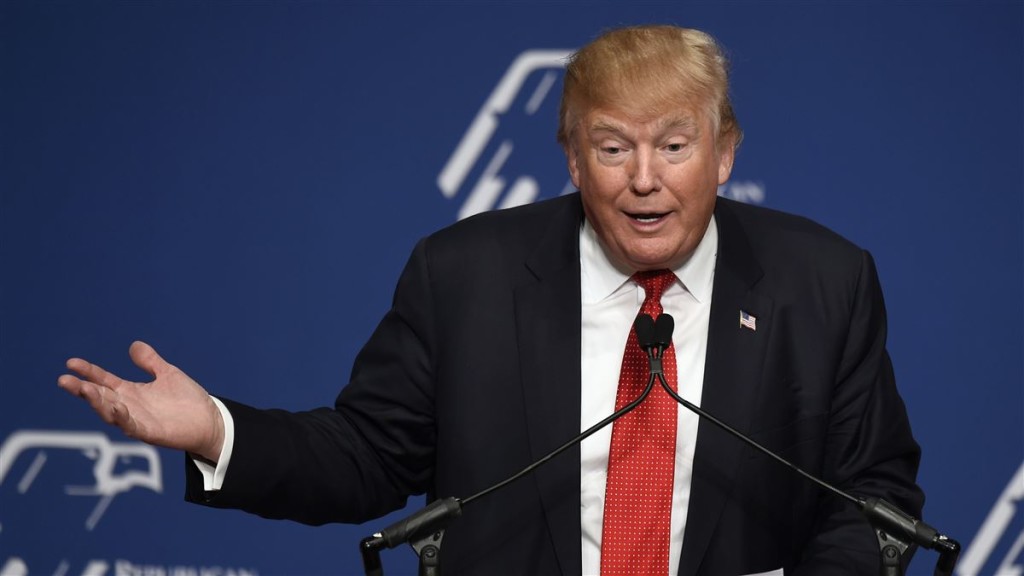
Since declaring his candidacy for president, Donald Trump has been at odds with his Republican rivals, allegedly the RNC executive committee, political action committees, the Democrats, and particularly the media who appear to despise this political outsider. The media paint a picture of a loudmouthed, uncouth racist, who is greedy beyond words and, therefore, evil. Let me go on the record by saying you cannot be successful in business, be it large or small, by practicing racism or dirty tricks. Maybe organized crime can get away with it, but there are simply too many bureaucratic rules and regulations to allow this to happen. Besides, it doesn’t make business sense to do so. Trump’s projects as a developer and entertainer are well known and documented, but the private side is a little sketchy, making fodder for the press. So what do we truly know about Mr. Trump? First, he has repeatedly said he doesn’t smoke, drink, or use illegal drugs, nor do his offspring. Anti-smokers should love this, as should Mothers Against Drunk Drivers (MADD). Marijuana proponents though will have a problem with his stance on drugs. He also loves sports, which most red-blooded American men should appreciate. We do not truly know how deeply religious he is, but he claims to be a proud Protestant, a Presbyterian to be exact. When he was younger, he was impressed by the work of Rev. Norman Vincent Peale, the acclaimed author of “The Power of Positive Thinking,” which touted “Believe in yourself!” and “Have faith in your abilities!,” lessons which Trump seems to have embraced. Then there are Trump’s philanthropic projects, which are often criticized by his antagonists. If you search the Internet, it won’t take long to compile a list of some of the charities he has contributed to, including: American Cancer Society American Diabetes Association Alliance for Lupus Research Arnold Palmer Foundation Autism Speaks Celebrity Fight Night Foundation Children with AIDS Citymeals-on-Wheels Crohn’s & Colitis Foundation of America David Foster Foundation The Doe Fund DoSomething.org Friends of Scotland Girl Up Institute for Implant Analysis at the Hospital for Special Surgery (which treated Trump’s parents). Jimmy Fund Joe Torre Safe at Home Foundation Los Angeles Police Memorial Foundation Make A Child Smile Appeal Make-A-Wish Foundation Mississippi Animal Rescue League Muhammad Ali Parkinson Center National Network to End Domestic Violence Neurofibromatosis, Inc. New York City Police Foundation New Yorkers For Parks Operation Smile Paralyzed Veterans of America Pediatric Epilepsy Project Police Athletic League (PAL) Raising Malawi Reef Relief Ronald McDonald House of New York Smile Train St. Francis Food Pantries and Shelters UNICEF United Way Vietnam Veterans Plaza in New York Wounded Warrior Project That’s 39 charities, not to mention those supported by his children, particularly The Eric Trump Foundation (ETF) which is dedicated to raising money for terminally ill children at St. Jude Children’s Research Hospital. It is my understanding that, to date, ETF has pledged nearly $28 million. Yet, Trump’s detractors in the press still portray him as Scrooge. Even if he were to donate all of his assets to charity, they would still find something wrong with his philanthropy, that he didn’t give enough. Also, there are several stories circulating about Trump’s kindness, most notably the “5 Acts of Kindness” by Trump. To paraphrase the popular article, the acts include: After three members of singer Jennifer Hudson‘s family were murdered, Trump provided a free sanctuary in Trump Tower to allow her to grieve. He also provided security to Hudson and her family to respect their privacy, all at his expense. When airlines wouldn’t help a boy with serious medical issues, Trump provided his own jet to transport him. He saved a family’s farm from going into foreclosure. When former Marine Sgt. Andrew Tahmooressi was released from a prison in Mexico last year, Trump sent him a generous check to help him restart his life. In 2013, a Buffalo, New York bus driver stopped to coax a woman from jumping off a bridge. After learning of the incident, Trump sent the bus driver $10,000 to thank him. There is also the story of a man who allegedly helped change a tire on Mr. Trump’s limousine. In gratitude, Trump and his wife sent the man’s wife a huge bouquet of flowers along with a note stating Trump paid off their mortgage. These are the stories the press has been made aware of; there may be many others. The fact is, we know Trump is capable of kindness. It certainly does not jibe with the press’ depiction of Trump as a tyrannical ogre. He is hardly the heartless heathen the media characterizes him as. Donald Trump is a tough businessman who relishes success, and rightfully so. That’s what capitalism is all about. However, there is nothing requiring him or anyone else to help others, but he does so willingly as he has demonstrated on several occasions. Regardless of what his detractors say, there is nothing to dispute his religion, his philanthropic projects, and his acts of kindness. If the anti-Trump people are even half correct about his contributions, he is still a generous philanthropist. • • • Tim Bryce is a freelance writer in the Tampa Bay area of Florida.
Robert Bentley to Alabama congressional delegation: Fight Obama on gun rights
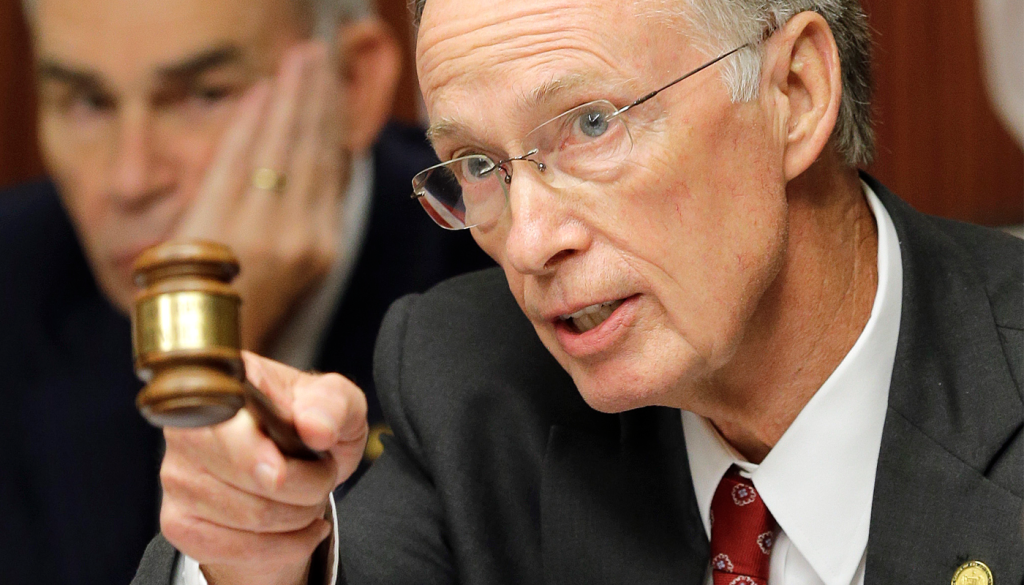
The office of Gov. Robert Bentley released its first statement of the New Year on Tuesday. Predictably, it was in keeping with his efforts to paint himself as ahead of the conservative curve despite his lingering image as a mushy moderate. Bentley implored the nine members of Alabama’s congressional delegation to keep up the fight against gun control, even as President Barack Obama announced plans to take executive action to tighten restrictions on who can access a firearm, citing wide support among the American public. “America’s founding fathers prioritized the right to keep and bear arms, and President Obama is overstepping his authority and threatening to take away our Second Amendment rights,” said Bentley in a brief statement Tuesday. “It is unacceptable for the President to bypass Congress and the U.S. Constitution with his plan.” Obama is expected to announce moves to close the so-called “gun show loophole” that allows prospective gun owners in many states to avoid a background check, a divisive issue going back to at least the Clinton administration. Obama may also announce support for requiring background checks for online firearms purchases. Those proposed moves are a bridge too far for Bentley, who said the administration is overstepping its role vis-á-vis Congress and the states. “The overreach by the President seems to be his preferred way of leading our country, and it is another reason why it is critical for Americans to send a conservative back to the White House in November. I encourage the Alabama congressional delegation to listen to the message of the Alabama people and fight to protect the fundamental rights of gun owners,” Bentley concluded.
Julie Delegal: We get drunk on Donald Trump, the Bundy brothers
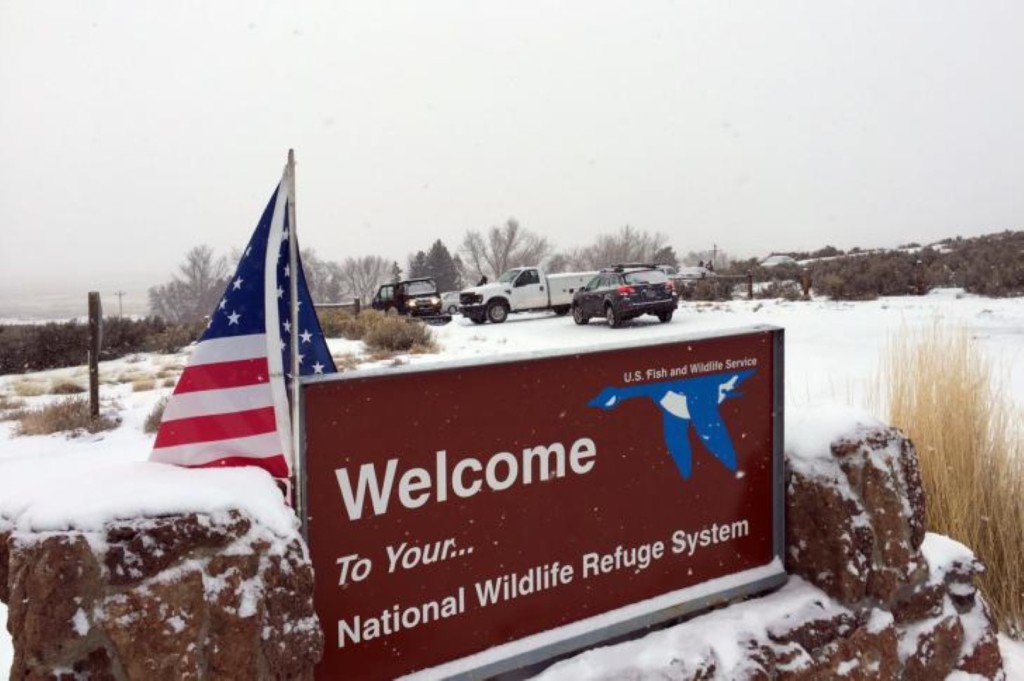
Go ahead, America. Tie one on. Let’s get it out of our system: our sick and ailing body politic. Let’s see how drunk we can get on the likes of Donald Trump and the Bundy brothers. Let’s stagger around in swagger, enjoying the warm rush of bravado that only our American concoction can deliver. Then, let’s sober up and get down to the real business of governance. The political brew of our times — a strong swirl of xenophobia, religious bigotry, gun rights, and trickle-down economics — is, in the end, poison. It’s a specially fermented brand of identity politics, designed to extract votes from white, working-class people. The elixir helps us take our minds off the bigger, more pressing issues: our nation’s evolving role in a very scary world, and the forever-changed nature of work. Automation; overseas outsourcing; corporate dominance; cheap labor markets in the Third World; an entire sector that makes its money by gambling on Wall Street; and a broken, completely monetized electoral system: All of these things threaten to derail the American dream. And that makes us anxious. So we drink our bad brew and look around for people to blame for our struggles: Mexican immigrants. Syrian immigrants. Muslims. Gay people. Black people. Feminists. Atheists. People who don’t follow the right interpretation of the Bible. And, of course, the government. Forty years of this noxious mash has led us to a near-fatal stupor. What other than the political equivalent of “beer goggles” would prompt the eminently reasonable John McCain to pick Sarah Palin as his running mate? What else could bring us to the point where potential GOP-presidential nominee Donald Trump is seriously advocating a religious test for new immigrants? Oh, but that tough talk is so intoxicating! What a nice, nostalgic-for-high-school buzz the nation got when Palin poked fun at Obama’s “mom jeans.” What warm, heady laughs America enjoyed when Trump insulted everyone from supermodel Heidi Klum (“no longer a ‘10’”) to actor Robert DeNiro (“not Albert Einstein”). Trump saved his worst insult, however, for his biggest rivals, former Florida Gov. Jeb Bush and former Secretary of State Hillary Clinton. According to the reality-TV boss who can slam Muslims and leap tall buildings in a single day, Bush and Clinton are “low energy.” Maybe they’re introverts. Maybe they’re contemplative. Maybe, as my Grandma used to say, “Still waters run deep.” While Trump, by contrast, just runs. What other but our toxic, electoral swill could embolden a treasonous band of armed insurgents to take over a federal building in Oregon? Gun-toting ranchers are occupying the building at the Malheur National Wildlife Refuge, just outside the township of Burns. Their leader is Ammon Bundy and his two brothers, all sons of the domestic terrorist from Nevada, Cliven Bundy. Dubbed “armed protesters” by the news media, these insurrectionaries are angry that a federal court ruled against their fellow ranchers, convicted arsonists Dwight and Stephen Hammond. The court lengthened the Hammonds’ sentences for burning federal lands. The Bundy brothers, like their father, are turning land management disputes with the federal government into questions of territorial sovereignty. And while they say they don’t intend to harm anyone, they came armed, and have promised to defend themselves as necessary. That’s not peaceful protest. It’s armed insurgency. By calling for other “patriots” to come help locals “claim back their land,” the Bundy brothers are setting the stage for an armed conflict similar to their father’s Nevada standoff over impounded cattle. After the standoff, Cliven Bundy found conservative-media celebrity, which he promptly used to share his racist views with the rest of America. He claims that his states’ rights views were a revelation from God. We’ve gone around the bend, our country has, and it’s going to take more than 30 days in detox to bring us back. It’s going to take every peace-loving defender of the U.S. Constitution to stand up and say, “No more,” not only in print, but at the ballot box. Only We the People can do this. Our would-be leaders, faced with armed traitors challenging the authority of the United States government, have chosen to remain silent. They stand to lose votes, you see, for the presidency of a government that their constituents claim is illegitimate. Will we destroy ourselves with identity politics? Or will we get sober, quit blaming the “other,” and try to figure out how to make America work better for everyone? Right now, we seem to want to continue our indulgence. The first step toward healing, it is said, is admitting we have a problem. • • • Julie Delegal, a University of Florida alumna, is a contributor for Folio Weekly, Jacksonville’s alternative weekly, and writes for the family business, Delegal Law Offices. She lives in Jacksonville, Florida. For more state and national commentary visit Context Florida.
Son of chief justice pleads not guilty to charges
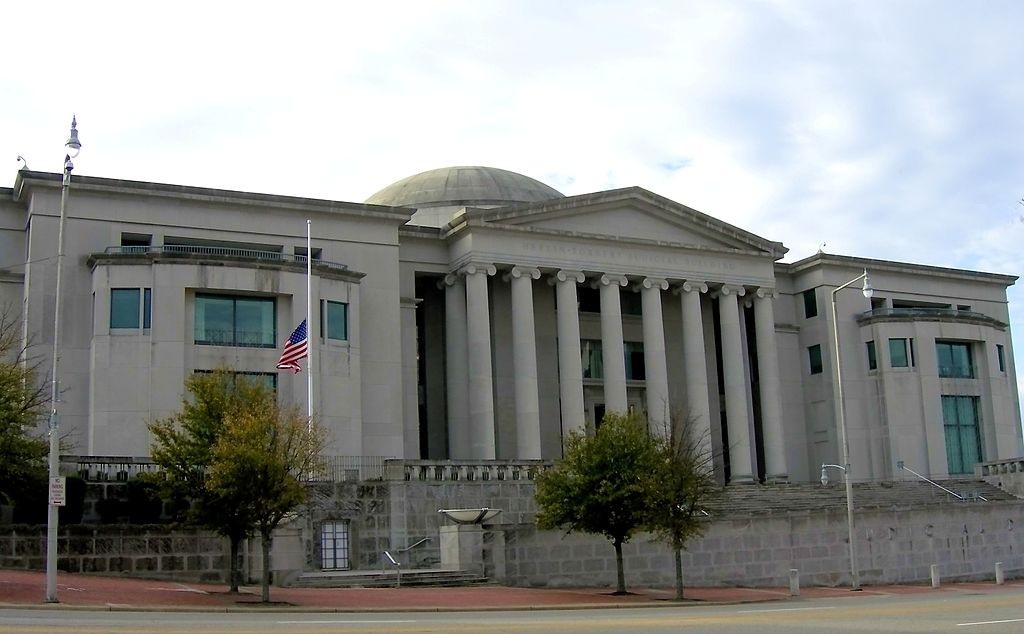
The son of Alabama’s chief justice has pleaded not guilty to drug charges. Court documents show Caleb Moore pleaded not guilty on Dec. 21 to two counts. Moore, 25, faces charges of felony possession of the prescription medication alprazolam and misdemeanor marijuana possession. Caleb Moore is the son of Alabama Chief Justice Roy Moore, a conservative Christian who made national headlines last year with his attempts to block gay marriage. Roy Moore also is known for erecting a Ten Commandments monument in Alabama’s court building. Caleb Moore was arrested in March in Troy. Police responding to a possible break-in said they reported smelling marijuana and finding Xanax. Caleb Moore pleaded guilty in 2013 and 2014 to separate misdemeanor charges of possession of drug paraphernalia. Republished with permission of the Associated Press.


